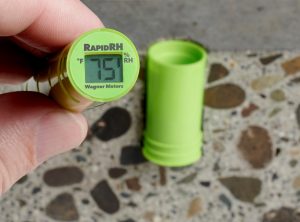Concrete Moisture Testing Practices Explained
When it comes to floors covering concrete, contractors and flooring installers may not have the same understanding of drying requirements. They need to coordinate their knowledge of concrete drying conditions in order to keep the project on track and on budget. Communication between subcontractors is key.
Concrete Moisture Conditions
Moisture’s migration through drying concrete can vary greatly depending on ambient conditions: air humidity, temperature and surface conditions (when the slab is not at service conditions). If, for example, a slab has been power-troweled, its surface loses the ability to release moisture in the slab. Drying time will slow or even halt completely. According to ASTM standards, the concrete stabilizes at service conditions for a minimum of 48 hours to meet ASTM Standard F2170 for conducting valid moisture (relative humidity) testing.
Concrete Moisture Test Methods
There have typically been three major types of tests for measuring concrete moisture. Each has a specific use that may or may not be best suited to monitoring a concrete slab as it dries.
I. Calcium Chloride Kits,
which have been historically used, produce unreliable results. They only measure moisture migration at a very shallow depth. Although this method is covered by ASTM F1869, the standard has been amended to exclude calcium chloride (also known as MVER) as an acceptable test method for lightweight concrete. Some specs still include calcium chloride kits, but this may not meet the ASTM requirements for your project.
II. Hand-Held Concrete Moisture Meters
are a valid general survey tool, but they do not read deeply enough to truly depict a slab’s moisture content (MC). Hand-held electromagnetic fields only penetrate about one inch into the slab. They can also interact with metal (ie. steel) in the concrete to give a false reading of the moisture conditions. Hand-held moisture meters cannot be reliably used to determine when to install a floor covering.
III. Relative Humidity (RH) Testing
is conducted through the use of in-situ probes which measure RH within the slab. Their depth-specific application has proven to accurately represent moisture conditions. Their very  location within the concrete means they are less susceptible to environmental or ambient changes at the surface. And contrary to some opinions, RH testing is not a long and involved process.
location within the concrete means they are less susceptible to environmental or ambient changes at the surface. And contrary to some opinions, RH testing is not a long and involved process.
Calibration variables need not complicate moisture content measurement. The process may seem cumbersome when we consider equilibration times as well as meter cables and programming. But not all RH systems are cumbersome. The Rapid RH L6, from Wagner Electronics, is pre-calibrated. It stays equilibrated because the Rapid RH meter is installed directly into the slab. It quickly and accurately tracks the relative humidity in concrete slabs. After an initial ASTM-required equilibration period, the Rapid RH L6 requires only minutes to ensure that the concrete is ready for the flooring application. The pen-style Reader has “touch-and-go capabilities,” so you’re not wasting time at each test hole. If the results indicate installation conditions, the probe is simply skim-coated into the slab.
Conclusion
ASTM F2170 RH testing is the recommended test method for monitoring moisture conditions in a concrete slab, because it is the best predictor of concrete dryness. Test methods like calcium chloride kits, or handheld surface meters, cannot present a vertically-integrated picture of overall “moisture” conditions. On-site concrete moisture management relies on an understanding of changeable conditions, testing methods and timing. Armed with tools such as the Rapid RH L6, general contractors and flooring installers can deliver quality results on schedule.